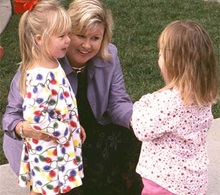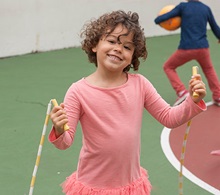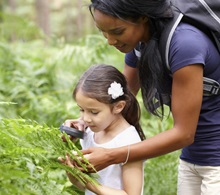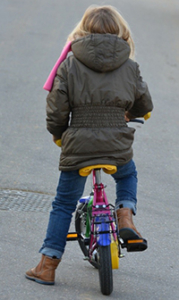 Planning a family picnic is the perfect activity for fun summer learning. With all the outside games and food, it’s easy to see why your kids will never know you have a secret curriculum up your sleeve! Here are 15 great tips to make your summer picnics full of learning – AND lots of fun:
Planning a family picnic is the perfect activity for fun summer learning. With all the outside games and food, it’s easy to see why your kids will never know you have a secret curriculum up your sleeve! Here are 15 great tips to make your summer picnics full of learning – AND lots of fun:
- Races: Running races, the egg and spoon race, hopping-on-one-leg races – anything goes! Lots of exercise is linked to more learning – and better behavior. Have the kids run for at least an hour during your picnic to maximize this fun learning booster.
- Ball Games: Playing catch and kicking the ball helps with a kind of coordination called Motor Planning, which helps your children get from one place to another. The more confident your children are with their bodies , the more likely they are to take on other challenges in life.
- Daisy Chains: Dandelions or other common summer weeds are perfect for making daisy chains. Help your little one create the chain to help fine motor skills develop – and don’t forget to count the flowers.
- Leaf Adventures: When your children are busy with something else, collect leaves from a few trees. Then ask them to find which trees they belong to. When they do, tell them about the trees they’ve discovered.
- Bubbles: Blowing bubbles helps little ones build the oral muscles needed to improve their speech. Count the bubbles for more fun and learning.
- Scavenger hunt: Create your hints ahead of time, and have one adult hide the items while another facilitates games with the kids. Aim for 5 -6 items for younger children; older kiddos can stay focused for a longer list.
- Chalk it up: Bring chalk to draw pictures, letters, numbers, and shapes. Show your child how to play hopscotch and four square, too.
- Duck, Duck, Squirt (Gun): This variation on Duck, Duck, Goose goes like this: Whoever is “it” goes around the circle, counting “duck, duck, duck” until he picks a player to squirt with the water gun. Race around the circle to see who can get back to the open position first, and try not to get too wet!
- Geocaching: This fun activity takes some preparation, but everyone in the family will enjoy it. Look up the location of treasures stashed nearby, and find them with the GPS on your phone.
- Cloud Watching: Lie on the grass together and watch the clouds go by. Have everyone say what shapes they see to encourage creativity. See what stories your little ones can make up about their cloud friends. Let the imagination flow!
- Freeze Tag: This classic game is a great way to challenge little ones to control themselves, be patient, and have fun. Make sure everyone has a chance to be “it!”
- Visit the Fire Department: Many parks are adjacent to a fire station. Teach the kids about fire safety by arranging a tour before your picnic. Most fire departments enjoy showing off their equipment to families.
- Healthy Food: Plan to pack simple, healthy snacks for your picnic. Choose foods with brain-building Omega 3 fatty acids such as chia seeds (fun and yummy to dip fruit in), edamame, salmon, and trail mix with walnuts. Your child’s brain – and behavior – will benefit.
- Fresh Fruit Ice Pops: Before the picnic, have the kids help select and prep their favorite fresh fruits. Freeze fruit chunks and coconut water in popsicle molds to enjoy at the park. Yum!
- Don’t Forget the Sunscreen! Any outside adventure needs sun protection. This is the chance to teach little ones about the dangers of too much sun – and how to avoid it. Bring along the bug repellent, too.
Need more fun ideas? Contact Premier Academy Today!

 Back-to-school is around the corner, but don’t be daunted by the transition from summer fun to school schedule. Children take their cues from their parents, so it’s key for US to get into the back-to-school mind-set first. Here are my pain-free prep tips for parents – our stressless adjustment will filter down to the kids, making it smoother for everyone.
Back-to-school is around the corner, but don’t be daunted by the transition from summer fun to school schedule. Children take their cues from their parents, so it’s key for US to get into the back-to-school mind-set first. Here are my pain-free prep tips for parents – our stressless adjustment will filter down to the kids, making it smoother for everyone. When it comes to child care, as a parent, there are a few things you should be looking out for when visiting daycare centers. We all want to send our child to a high standard, and good working preschool. As parents, we should always want to give our kids the best head start in life, and by far the most effective way to start with this is to send your kids to a high quality child care center. Kids need to socialize with other children from a very young age, it allows them to become familiar to social interaction, sharing and good manners, this is what your child will gain from attending a preschool. Not only will they learn how to act and behave around others, they will learn valuable reading and writing skills. Statistics show that kids who don’t attend preschools and head straight into schools have a much harder time learning than the children who did attend preschools. These statistics come in very handy when trying to give your kids the best head start in life, and it’s obvious which choice you should make.
When it comes to child care, as a parent, there are a few things you should be looking out for when visiting daycare centers. We all want to send our child to a high standard, and good working preschool. As parents, we should always want to give our kids the best head start in life, and by far the most effective way to start with this is to send your kids to a high quality child care center. Kids need to socialize with other children from a very young age, it allows them to become familiar to social interaction, sharing and good manners, this is what your child will gain from attending a preschool. Not only will they learn how to act and behave around others, they will learn valuable reading and writing skills. Statistics show that kids who don’t attend preschools and head straight into schools have a much harder time learning than the children who did attend preschools. These statistics come in very handy when trying to give your kids the best head start in life, and it’s obvious which choice you should make. There are two words that can send your summer spirit soaring: “I’m bored!” Your child has suddenly gone from an action-packed school year to the carefree days of summer. As much as you are both happy to be done with homework for a while, all of this freedom can be problematic. You want to chill out with some lemonade yet your kids expect you to be the peppy cruise director. But it is possible for everyone to feel the joy of the season, make wonderful memories and be truly happy together. No more saying, “What can we do this summer?”
There are two words that can send your summer spirit soaring: “I’m bored!” Your child has suddenly gone from an action-packed school year to the carefree days of summer. As much as you are both happy to be done with homework for a while, all of this freedom can be problematic. You want to chill out with some lemonade yet your kids expect you to be the peppy cruise director. But it is possible for everyone to feel the joy of the season, make wonderful memories and be truly happy together. No more saying, “What can we do this summer?” Did you know that most camp planning takes place in early winter and spring? Just when you were getting over the holiday stress and still bundled in your Snuggie, you need to find the place for your child to get out of the house — um, we mean thrive — this summer with affordable summer programs in Omaha, Nebraska.
Did you know that most camp planning takes place in early winter and spring? Just when you were getting over the holiday stress and still bundled in your Snuggie, you need to find the place for your child to get out of the house — um, we mean thrive — this summer with affordable summer programs in Omaha, Nebraska. Family vacations are great for bonding with loved ones as you get away from your normal routines. But a family vacation can sometimes feel like no vacation at all for parents chasing after kids. Parents need time to themselves, and not just for romance, but to relax, reconnect and revisit what brought them together.
Family vacations are great for bonding with loved ones as you get away from your normal routines. But a family vacation can sometimes feel like no vacation at all for parents chasing after kids. Parents need time to themselves, and not just for romance, but to relax, reconnect and revisit what brought them together. Remember when you were a kid and summer seemed endless — in a good way?
Remember when you were a kid and summer seemed endless — in a good way? There are many reasons kids should play outside, from expressing creativity to running freely to making messes without worrying about dirtying the house. In addition to these fun reasons, there are also many health benefits that make outdoor play great for children.
There are many reasons kids should play outside, from expressing creativity to running freely to making messes without worrying about dirtying the house. In addition to these fun reasons, there are also many health benefits that make outdoor play great for children.